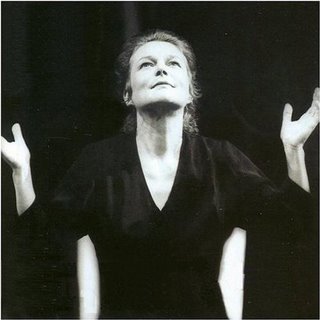"Opera" on DVD: Theodora
| Available at Amazon: Handel, Theodora, Lorraine Hunt Lieberson, David Daniels, directed by Peter Sellars, Glyndebourne Opera, William Christie (released on June 29, 2004) |
The Christians, costumed in either all black or all white, are less obviously characterized. In her first appearance, the noble Theodora (a radiant Dawn Upshaw) hands her earrings and pearl necklace to her assistant, Irene (a truly incendiary Lorraine Hunt, before her marriage to Peter Lieberson), who shows the jewels around the group as the "vain pomp of proud prosperity." So, the Christians are people who have rejected the money-worshipping ways of the imperialist power, and the other Christians then come forward to throw their money (dollars, of course) on the bonfire of vanities. Of course, a simple rejection of money does not really explain why or how Irene convinces her confreres to face death at the hands of the imperialists, or why the imperialists want to kill those who simply don't want anything to do with their money (or force Theodora into sexual slavery just for throwing away her pearls). Basically, the story has to be about religious persecution or it does not make much sense.
 Lord, to Thee each night and day, Strong in hope, we sing and pray. Words by Thomas Morell, set in Handel's Theodora |
It is not that I did not enjoy this remarkable staging (although I could have done without all the high-school show choir hand movements). The enthusiasm Sellars brings to the musicians usually makes their performance warm and exciting, and it is no different here. However, it is really the music that makes the magic happen. William Christie leads the Orchestra of the Age of Enlightenment (with Harry Bicket at the harpsichord) in a lovely performance, with the sound captured quite well. The viewing time is over three hours, even though Sellars cut out a few lines of recitative here and there (it includes the material added by Handel for the 1755 revival). The singing from all the soloists and the chorus make this a must-see.
Kultur D2099





















































No comments:
Post a Comment